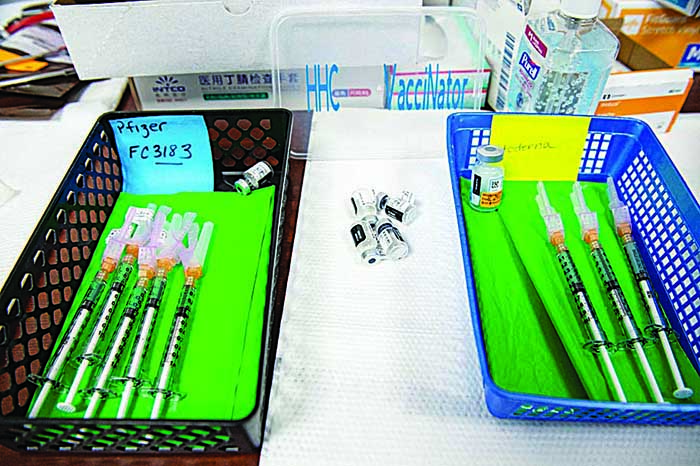 HARTFORD: In this file photo, needles preloaded with the Moderna and Pfizer-BioNTech COVID-19 vaccines sit in baskets awaiting patients at the vaccine clinic at Hartford Hospital in Hartford, Connecticut. —AFP
HARTFORD: In this file photo, needles preloaded with the Moderna and Pfizer-BioNTech COVID-19 vaccines sit in baskets awaiting patients at the vaccine clinic at Hartford Hospital in Hartford, Connecticut. —AFPWASHINGTON: The United States has thrown away at least 15.1 million doses of COVID-19 vaccines since March 1, according to a report by NBC News. The figure is far higher than previously thought and probably still an undercount, because it is based on self-reported data from pharmacies, states and other providers, NBC said, quoting a response it received to a request for public data. At least seven states are missing from the figures, as well as major federal agencies.
Reasons for dose wastage vary and include cracked vials, errors in diluting vaccines, freezer malfunctions and more doses in a vial than people who want them, with a limited window of a few hours to use a vial once it is punctured. The news comes as less-developed countries struggle to vaccinate their populations due to supply constraints, with the continent of Africa just 2.8 percent fully vaccinated, according to public data collected by Our World in Data.
The United States, on the other hand, has administered some 440 million doses and vaccinated 52 percent of its population-a figure that could have been much higher but for lingering vaccine hesitancy among a large segment of people. More than a million Americans have received a third dose on the basis of weakened immunity, and the country plans to make third shots available to everyone eight months after their second, beginning later this month.
“It’s an equity issue,” Tim Doran, professor of health policy at the University of York told NBC. “You’ve got a very wealthy country with good access to vaccines essentially throwing vaccine away.” The United States has pledged around 600 million doses to middle- and lower-income countries, and had donated 110 million as of early August.
In another development, North Korea has rejected around three million doses of a Chinese COVID-19 vaccine, suggesting they should be given to countries in greater need, Unicef said yesterday. The impoverished North was the first country to impose a strict lockdown when it sealed its border in January last year to stop the virus spreading from neighboring China, where it first emerged before sweeping the world. Pyongyang insists it has yet to see any cases of the virus-a claim that analysts doubt-but it has paid a huge economic price for the blockade, with the regime admitting in June it was tackling a “food crisis”.
Regardless, the isolated country told UNICEF-which distributes vaccines under the COVID-19 Vaccine Global Access (Covax) program for low-income countries-that the Chinese-made vaccines could be given to others, the UN agency said. North Korea’s public health ministry “has communicated that the 2.97 million Sinovac doses being offered to DPR Korea by Covax may be relocated to severely affected countries in view of the limited global supply of COVID-19 vaccines and recurrent surge in some countries”, a UNICEF spokesperson told AFP.
Pyongyang would “continue to communicate” with COVAX “to receive COVID-19 vaccines in the coming months”, they added. In July, a South Korean think tank affiliated with Seoul’s spy agency said Pyongyang had also rejected shipments of AstraZeneca’s vaccine offered by the Covax scheme, apparently over concerns about side effects. The Institute for National Security Strategy added at the time that the North was not equipped with sufficient cold chain storage for the Pfizer and Moderna vaccines, while being sceptical about the effectiveness of Chinese vaccines.—Agencies









